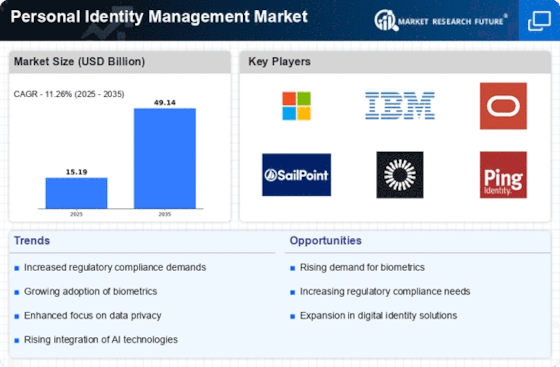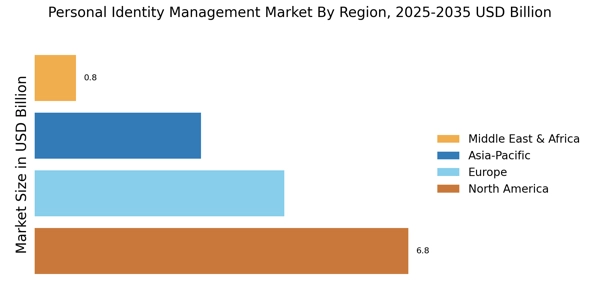Rising Cybersecurity Threats
The increasing frequency and sophistication of cyberattacks has heightened the need for robust Personal Identity Management Market solutions. Organizations are compelled to invest in advanced identity management systems to safeguard sensitive data and protect against identity theft. According to recent statistics, the global cost of cybercrime is projected to reach trillions of dollars by 2025, underscoring the urgency for effective identity management strategies. As businesses face mounting pressure to secure their digital assets, the demand for comprehensive identity management solutions is likely to surge, driving growth in the Personal Identity Management Market. This trend indicates a shift towards proactive measures in identity protection, as organizations recognize the potential financial and reputational damage associated with data breaches.
Growing Regulatory Requirements
The landscape of data protection regulations is evolving, compelling organizations to adopt stringent identity management practices. The Personal Identity Management Market is significantly influenced by regulations such as the General Data Protection Regulation (GDPR) and the California Consumer Privacy Act (CCPA). These regulations mandate organizations to implement robust identity verification processes and ensure the secure handling of personal data. As compliance becomes a critical concern, businesses are increasingly investing in identity management solutions that not only meet regulatory standards but also enhance customer trust. The market is projected to expand as organizations seek to avoid hefty fines and reputational damage associated with non-compliance. This regulatory landscape is likely to drive innovation within the Personal Identity Management Market, as companies develop solutions that align with evolving legal requirements.
Increased Adoption of Cloud Services
The proliferation of cloud computing has transformed the landscape of the Personal Identity Management Market. As organizations migrate to cloud-based platforms, the need for effective identity management solutions becomes paramount. Cloud services facilitate remote access and collaboration, yet they also introduce complexities in managing user identities and access controls. The market for cloud identity management solutions is expected to grow significantly, with estimates suggesting a compound annual growth rate of over 20% in the coming years. This growth is driven by the necessity for organizations to ensure secure access to cloud applications while maintaining compliance with data protection regulations. Consequently, the Personal Identity Management Market is witnessing a shift towards integrated solutions that can seamlessly manage identities across diverse cloud environments.
Shift Towards Biometric Authentication
The Personal Identity Management Market is experiencing a notable shift towards biometric authentication methods. As traditional password-based systems become increasingly vulnerable to breaches, organizations are exploring biometric solutions such as fingerprint recognition, facial recognition, and iris scanning. These technologies offer enhanced security and user convenience, making them attractive options for identity verification. The biometric authentication market is anticipated to grow at a rapid pace, with projections indicating a compound annual growth rate exceeding 20% over the next few years. This trend reflects a broader movement towards more secure and user-friendly identity management solutions. As organizations prioritize security and user experience, the adoption of biometric technologies is likely to reshape the Personal Identity Management Market, driving innovation and investment in this area.
Emergence of Decentralized Identity Solutions
The concept of decentralized identity is gaining traction within the Personal Identity Management Market, driven by the need for greater user control over personal data. Decentralized identity solutions leverage blockchain technology to enable individuals to manage their identities without relying on centralized authorities. This approach not only enhances privacy but also reduces the risk of data breaches associated with centralized databases. The market for decentralized identity solutions is expected to expand as organizations recognize the potential benefits of empowering users with control over their personal information. This trend may lead to a paradigm shift in how identities are managed, fostering trust and transparency in digital interactions. As the Personal Identity Management Market evolves, the integration of decentralized solutions could redefine the standards for identity verification and data protection.

















